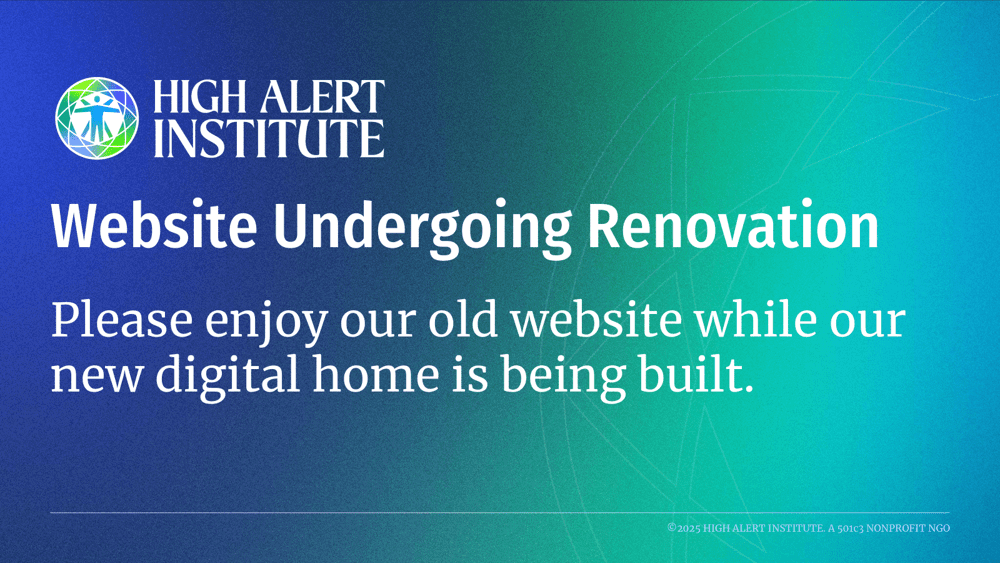High Alert Institute
Getting Voted Back onto the Island; Part 5 – Thriving Through the Disaster

Getting Voted Back onto the Island
Part 5 – Thriving Through the Disaster
By: Dr. Maurice A. Ramirez
Updated: 04Oct2022
An increasing number of business continuity professionals and disaster recovery experts are discovering that the most vulnerable links in the continuity of operations chain are the people a business serves and those who serve them. While this seems intuitively obvious now, for decades, resolving the fragility of technology has been the exclusive focus of the industry.
This series has explored why employees and customers are prone to staying away from business sites, gathering their “tribe” close, and effectively voting businesses off the island. Last month, this series explored Gathering: Tactical, Intellectual, and Societal Needs, discovering that businesses could not only survive but also speed their recovery by supporting and promoting the recovery of their employees.
“A” is for Altruism
Many businesses and individuals are eager to volunteer and assist those in need when a disaster strikes. They want to help rebuild the damaged homes and businesses, and they often donate the necessary materials and staffing to do so. Unfortunately, the resources that arrive on a volunteer and donation basis typically run out much sooner than expected. Businesses often gladly give their time and resources to those in need and feel guilty charging for additional services when their volunteer time ends. So they pack up and leave the area, proud of their good deeds, yet leaving those in the disaster area with few recovery options.
A great example is what happened in Port Charlotte, Florida, after hurricane Charley in 2004. Initially, after the hurricane, a large number of contractors went to the area, donating services, supplies, and other things needed to rebuild the community. The federal government also paid many rebuild bills, even things not usually covered by FEMA. Then the money started running out, and most volunteers went home.
The residents of Port Charlotte did not want the contractors to leave and would have paid the contractors their standard rate to stay and finish the disaster recovery efforts. The contractors who originally came on a volunteer basis felt guilty about taking money from disaster victims. As a result, even two years later, many Port Charlotte residents still sought reputable contractors to help them rebuild. As communities begin the recovery and rebuilding process after Hurricane Ian, every impacted individual hopes business owners strike a balance between the desire to be altruistic and the need to provide sustainable business services.
So does that mean a business can maintain an income during a disaster and not feel guilty?
Yes!
3 Ways to Serve the Community
When it comes to profiting from disaster, most people think of price gouging or profiteering. Price gouging is immoral, unethical, and illegal in every state and territory. When Hurricane Katrina hit New Orleans in 2005, unscrupulous store owners sold generators that usually retailed for a few hundred dollars for several thousand dollars. All those people received jail time or fines, and their business licenses were revoked. Such people are seeking to profit from misery.
There are essentially three ethical ways to make money after a disaster.
- Volunteer and Donation. In this scenario, you volunteer your time and donate your products or services. You cover all your costs and accept nothing in return, other than perhaps food and lodging. In return for your time and materials, you get the warm fuzzy feeling of doing something good for the community. You become an everyday hero. If you are visible during this time, you also get great publicity, which could lead to business down the road from those who remember your good deed.
- Discounted Services. The most common scenario, discounted services, means you offer your products and services to the community at a discounted rate. Those who opt for this route figure out how low they can price something without the decision burdening the business. Realize, though, that no one in the community asked for the discount (although none will turn down the discount). Often, the business owner gives the discount because they have some level of altruism.
- Full Price. In this scenario, you come into the community and bid a fair market price for a product or service, roughly equivalent to what other companies would charge during non-disaster times. And because it’s a fair market price, people are more than happy to pay it. Charging regular price is entirely moral and ethical. Unfortunately, few businesses transition to full fare after starting as a volunteer. However, if you want to grow your business, this is the way.
From Free to Fee
Given that the ideal situation for every business in a disaster-stricken community is to move from volunteerism to regular business operations as the disaster life cycle turns, how does a business transition from a volunteer to a paid consultant or contractor? Here are some suggestions:
- Be upfront. State how long you can offer your products or services for free. For example, tell people, “I can afford to volunteer for two weeks. I can afford to bring X amount of materials. If we run out of materials before two weeks, you supply the material, and I’ll stay the remainder of the time, I stated.” After the two weeks are up, before you pull out and leave, talk with the people you have been helping. Explain again that you can only afford to volunteer for two weeks. Very often, at that point, they will ask you to bid for the remainder of the work. Then you can offer a fair market bid. If you get a “yes,” then why would you not stay? You are already there, and now you are making money. If they say “no,” they take responsibility for their recovery. At that point, you can go home and tend to your business, knowing that you have done a good deed.
- When your community does its disaster relief plans (before a disaster hits), put your company on the list of businesses available to aid recovery efforts. Businesses can work with their local communities to be “first-called” when a disaster strikes. What does that mean? Assuming that the business is capable of responding, that business will put the community recovery at the front of the line.
- Be proactive and contract to provide recovery services before a disaster strikes. A client company contracts with you and pays a retainer fee so that you will put that company at the front of the list in the event of a disaster. In return, you get the contract for the other work the company needs done. Such “standby” contracts are not only wholly ethical, but they are also a win-win solution. The company gets the repairs they need, and you have guaranteed work. What could be better?
Strive to Thrive
The bottom line is that businesses need to understand the different ways they can help and get over the stigma of charging for services during a disaster. The people receiving your products or services do not mind paying for them. Nobody on the receiving end of the products or services expects to get everything free, and most of them will gladly pay a fair market price for anything you offer. So take full advantage of this profitable market segment. By doing so, you will be helping people in need while helping your own business grow.
High Alert Institute
4800 Ben Hill Trail
Lake Wales, FL 33898
Office: 863.696.8090
FAX: 407.434.0804
EIN: 27-5078437
Info@HighAlertInstitute.org
Privacy Policy
Cookie Policy
Terms of Use
Disclaimers
Get Your Data
Shipping Policy
Message Us
Transparency
Registrations
Do Not Sell Info
Return Policy
A COPY OF THE OFFICIAL REGISTRATION AND FINANCIAL INFORMATION MAY BE OBTAINED FROM THE DIVISION OF CONSUMER SERVICES BY CALLING TOLL-FREE, WITHIN THE STATE, 1-800-435-7352 (800-HELP-FLA), OR VISITING www.FloridaConsumerHelp.com. REGISTRATION DOES NOT IMPLY ENDORSEMENT, APPROVAL, OR RECOMMENDATION BY THE STATE. Florida Registration #CH68959
REGISTRATION WITH A STATE AGENCY DOES NOT CONSTITUTE OR IMPLY ENDORSEMENT, APPROVAL OR RECOMMENDATION BY THAT STATE.










